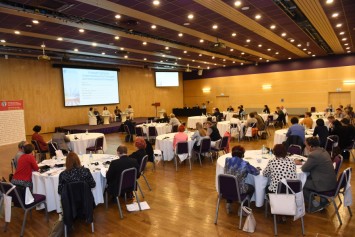Universal values at heart of human rights education
The foundation for an education based on a human rights-centric approach, encompassing universal values of understanding and tolerance, and of seeing cultural differences as opportunity rather than threat was the message in Riga, Latvia.

A consensus emerged on the importance of an education that promotes acceptance over hate at a symposium on human rights and values in education organised by Education International and the Latvian Teachers' Union LIZDA.
Education International (EI) General Secretary Fred van Leeuwen opened the two-day symposium by making a passionate case for a holistic approach to an education that enables diverse democratic societies to live together.
"In our multicultural societies the question of identity is crucial. Pride in one’s own identity should go hand in hand with respect for the identity of others," he said. "Our schools should recognize the identities of each student, whatever his or her origin or background. Schools should be places where children and young people learn to live together, understanding the richness of diversity, because the societies in which they must live in the future will all be diverse, multicultural democracies."
This view was echoed by keynote speaker Sneh Aurora, who gave an overview of international instruments tackling questions of human rights education and global citizenship, which have been discussed and defined by the international community and resulted in declarations and policy documents adopted by intergovernmental organisations such as UNESCO and the UN. Aurora's extensive research inform a background paper on Human Rights Education published for the symposium. It is available to download here.
The day was rounded off by panel discussions and workshops that enabled participants to share experience and best practice from their countries and learn from their colleagues' knowledge.
Haldis Holst, EI Deputy General Secretary, summarized the successful proceedings. "Teachers are crucial to fostering social values - democracy, equality, cultural understanding, respect of rights," she said. "The very soul of the teaching profession is the desire to build equity in the classroom, in the school, in society. Teachers unions bring solutions to the table, showing pathways to democracy, human rights and a sustainable future."
Source: Education International
- 335 reads
Human Rights
Ringing FOWPAL’s Peace Bell for the World:Nobel Peace Prize Laureates’ Visions and Actions

Protecting the World’s Cultural Diversity for a Sustainable Future

The Peace Bell Resonates at the 27th Eurasian Economic Summit

Declaration of World Day of the Power of Hope Endorsed by People in 158 Nations

Puppet Show I International Friendship Day 2020

